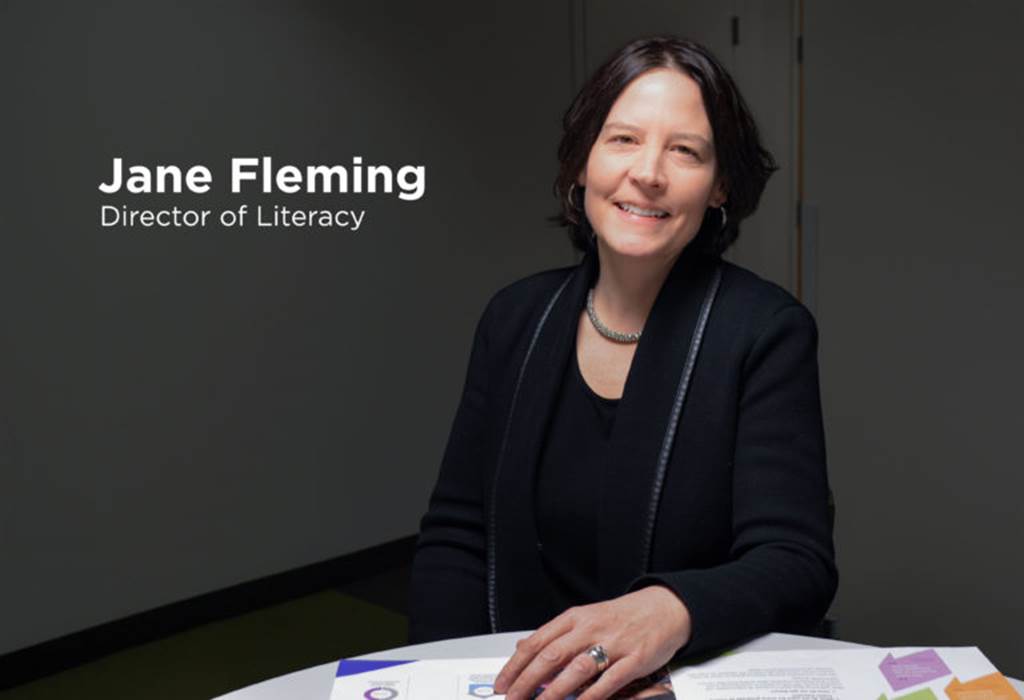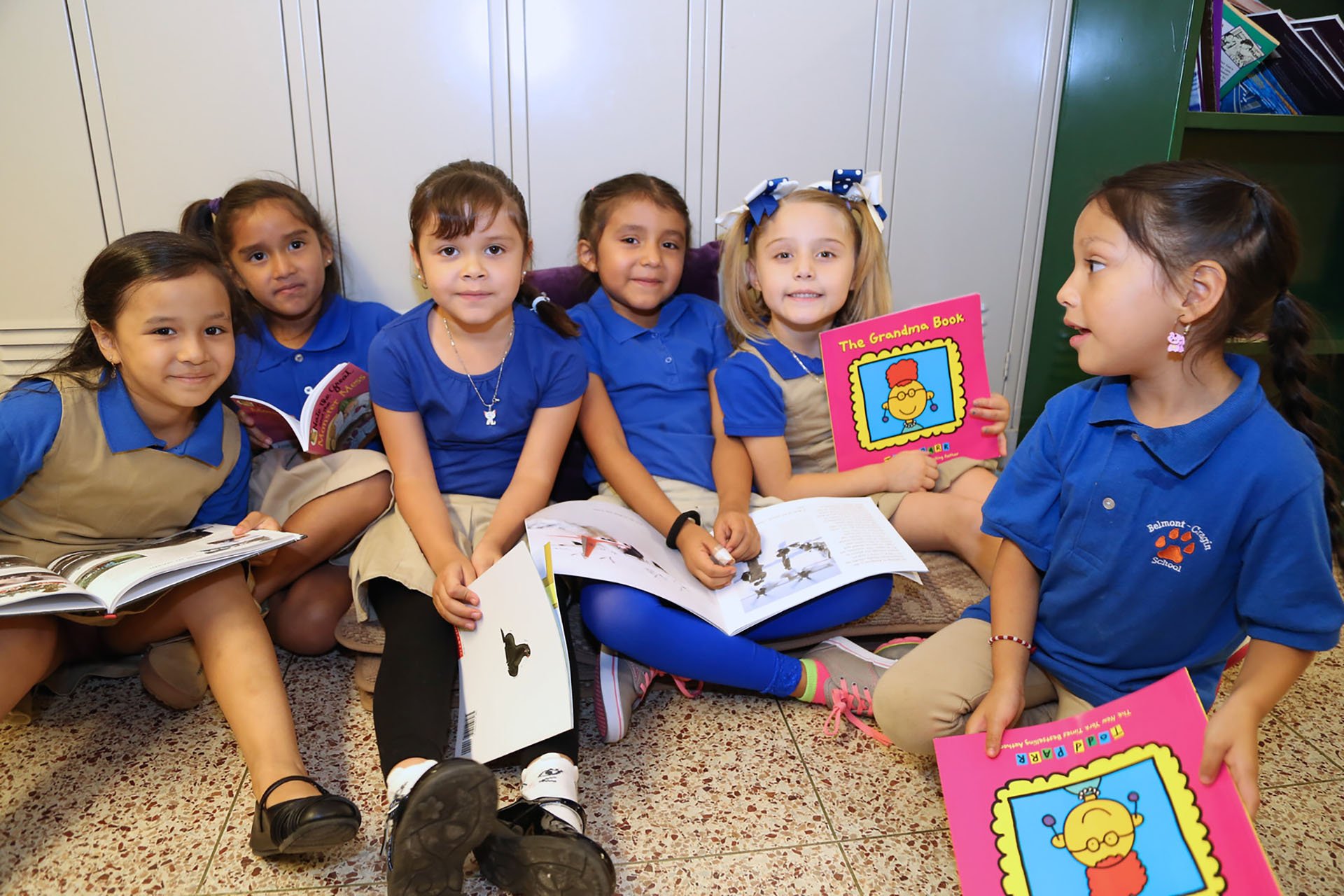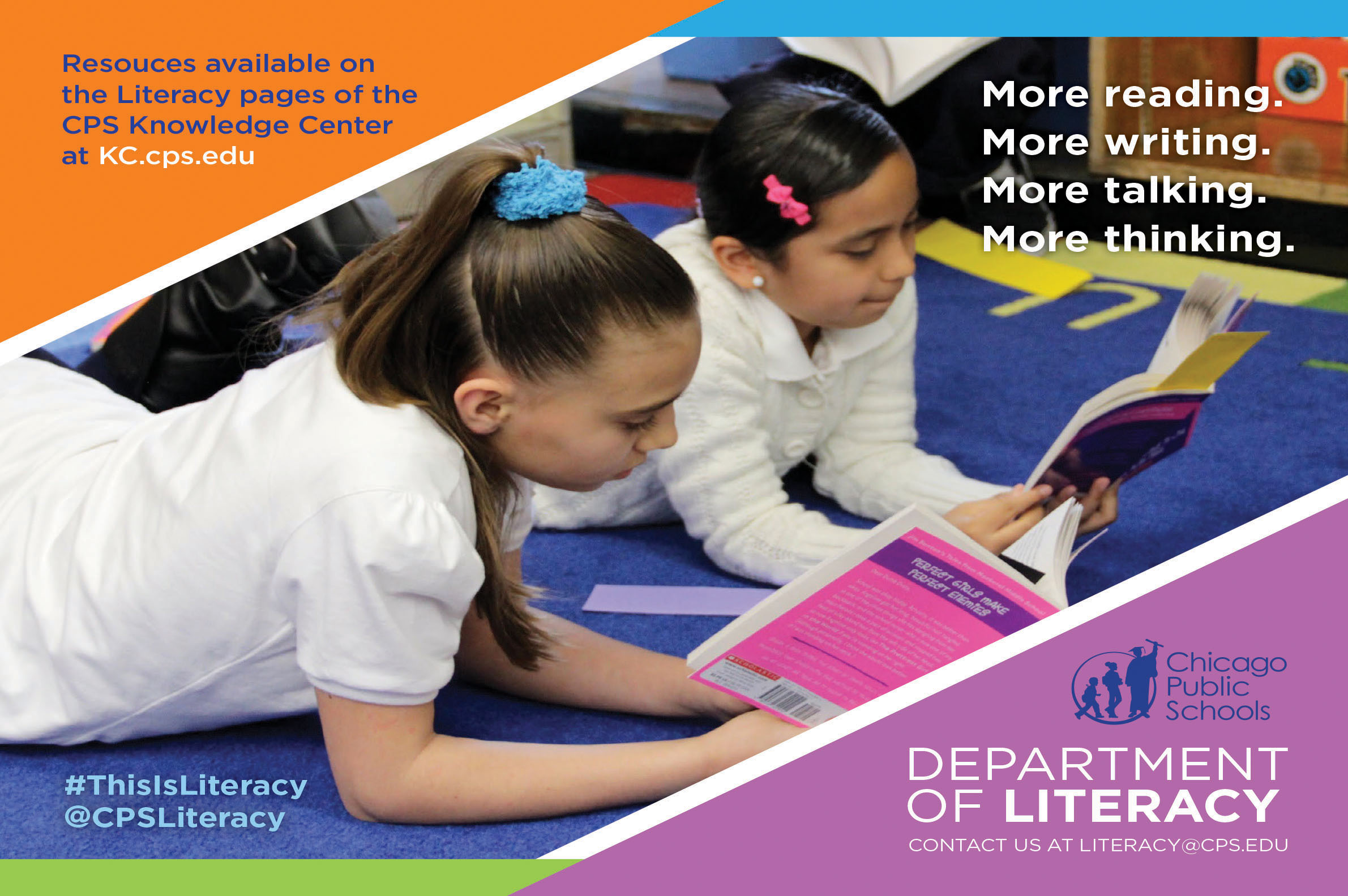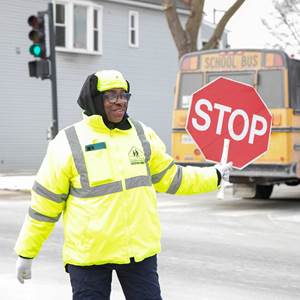Thinking Beyond Reading | Pensar más allá de la lectura
14 January 2020
Though she’s spent much of her career immersed in an abundance of children’s literature, Dr. Jane Fleming—Chicago Public Schools’ Director of Literacy—will be the first person to tell you that there is no quintessential text that should be taught in every classroom.

CPS’ Visionary Plan to Help Students Develop Advanced Literacy
Though she’s spent much of her career immersed in an abundance of children’s literature, Dr. Jane Fleming, Chicago Public Schools’ Director of Literacy, will be the first person to tell you that there is no quintessential text that should be taught in every classroom.
“I think the best book for a student is going to be the one that they connect with in whatever way and inspires them to imagine [themselves] as a storyteller or a writer or just an enjoyer of literature,” she said. “For a long time, I feel that we’ve presented students with a narrower version of what counts as important literature than maybe we ought to.”
Some CPS students might see themselves in one of Dr. Fleming’s personal favorites: Crown: An Ode to the Fresh Cut—a brightly illustrated, poetic depiction of a boy’s experience at the barbershop. Others might be drawn to one of her other recommendations: Niño Wrestles the World—a story about fighting imaginary monsters that is bursting with onomatopoeia and nods to Mexican culture. Dr. Fleming believes that selecting texts for students starts with getting to know them and their families.
“When we think about cultural relevance, we want to think broadly beyond race, socioeconomic status, religion, and family structure,” she said. “They are central to students’ identities and matter a lot in terms of representation, but we should also be asking questions like: ‘What are contemporary kids into?’ and ‘Who are they hanging out with?’ and ‘What’s going on in their neighborhoods?’ Those questions are also going to be relevant to what students experience and care about and will impact the degree to which they feel connected, motivated, and engaged in school.”
On top of using student experiences as entry points to creating curriculum, Dr. Fleming asserts that modern instruction should no longer simply equate “literacy” with “reading” or “texts” with “books.” Because students should be gaining advanced skills in multiple literacies, from biliteracy and digital literacy to disciplinary literacy in content areas such as math, social science, and the arts, the district encourages teachers to expose them to podcasts, primary sources, interviews, and digital databases.
“It’s not enough in 2020 to have basic or even proficient literacy skills—students should be graduating with advanced literacy skills,” Dr. Fleming said. “We need to provide instructional opportunities for students that enable them to communicate with a variety of audiences in all the ways that we communicate in 2020 and beyond.”
Based on extensive research and stakeholder feedback, Dr. Fleming and the Department of Literacy are developing a plan to codify the district’s literacy strategy so it aligns with CPS’ overarching Five-Year Vision. While Dr. Fleming acknowledges that many schools across the district already show impressive reading attainment, the plan will highlight practices that should be implemented in every classroom to ensure that all students are developing advanced reading, writing, critical thinking, and communication skills.
“As we push toward equity for every student in every neighborhood, we’re encouraging schools at all levels to think about the slice of their student population that they might not be reaching well,” she said. “Even if I’m a top school and I’ve implemented balanced literacy instruction across subjects, I should be looking toward the next level and thinking about how I can push students a little further in their thinking.”

Dr. Fleming believes that literacy instruction should be rigorous and reflect five key practices: providing an abundant array of diverse and engaging texts; encouraging extensive discussions to build students’ academic language and vocabulary; offering frequent opportunities to work through each stage of the writing process; connecting classroom lessons to real-world applications of literacy and language; and focusing on communicating and creating content in a digital environment. While these practices will look different in a kindergarten class and a high school English class, every classroom should include them to ensure that all students are developing multiple literacies.
One of the ways CPS plans to promote these practices is to “harness talent from within” by utilizing some of the countless classrooms across the city in which teachers are already building on students’ cultural and linguistic strengths and are tailoring instruction to meet their individual needs. By building off the philosophy that teachers learn best by observing other teachers, the Department of Literacy recently launched a Literacy Fellows program that allows standout teachers to advise on professional learning opportunities and showcase their classrooms as examples of effective advanced literacy instruction.
Summarizing their departmental goals in eight words is no easy feat, but Dr. Fleming and her team have done just that: “More reading. More writing. More talking. More thinking.”
More reading because students will have access to a vast array of literature that both mirrors their own lived experiences and provides a window into the cultures and ideas of others. More writing because students will be encouraged to create and nurture their own written work from first draft through publication. More talking because students will bring concepts to life by having thought-provoking discussions about the themes that are meaningful to them.
And more thinking because—whether the idea pops into their heads after finishing an award-winning novel, an intricate poem, or a fascinating podcast episode—students will be empowered to know that they can change the world.

Plan visionario de CPS para ayudar a los estudiantes a desarrollar habilidades avanzadas de alfabetización
Aunque la Dra. Jane Fleming, Directora de Alfabetización de las Escuelas Públicas de Chicago, ha dedicado gran parte de su carrera profesional inmersa en una gran cantidad de literatura infantil, será la primera persona en decirte que no existe ningún texto por excelencia que deba ser enseñado en todas las aulas de clase.
“Creo que el mejor libro para un estudiante será aquel con el que se conecte de cualquier manera, y aquel que le inspire a imaginarse [a sí mismo] como un narrador o escritor o simplemente como alguien que disfruta la literatura”, dijo. “Durante mucho tiempo, siento que a los estudiantes les hemos presentado una versión más breve de lo que cuenta como literatura importante que lo que quizás deberíamos”.
Algunos estudiantes de CPS podrían verse a sí mismos en una de las obras favoritas de la Dra. Fleming: Crown: An Ode to the Fresh Cut, una representación bien ilustrada y poética de la experiencia de un chico en la barbería. Otros podrían sentirse atraídos por una de sus otras recomendaciones: Niño Wrestles the World, una historia sobre la lucha contra monstruos imaginarios que contiene muchas onomatopeyas y hace referencia a la cultura mexicana. La Dra. Fleming cree que la buena selección de textos para los estudiantes consiste en conocerlos y a sus familias.
“Cuando pensamos en la relevancia cultural, debemos pensar ampliamente más allá de la raza, el estatus socioeconómico, la religión y la estructura familiar”, dijo. “Son fundamentales para la identidad de los estudiantes y tienen mucha importancia en términos de representación, pero también deberíamos hacernos preguntas como: ¿Qué les gustan a los niños contemporáneos?, ¿con quiénes pasan el rato? y ¿qué está ocurriendo en sus vecindarios?. Esas preguntas también serán relevantes a lo que los estudiantes experimentan y se preocupan, e impactarán el grado en que se sienten conectados, motivados y enfocados en la escuela”.
Además de usar las experiencias de los estudiantes como táctica inicial para la creación de un currículo, la Dra. Fleming afirma que la instrucción moderna ya no debería simplemente equiparar “la alfabetización” con “la lectura”, o “los textos” con los “libros”. Debido a que los estudiantes deben estar adquiriendo conocimientos avanzados —ya sean bilingües, informáticos, matemáticos, sociales y artísticos—, el distrito alienta a los maestros a exponer a los estudiantes a podcasts, fuentes primarias, entrevistas y bases de datos digitales.
“En 2020, no es suficiente poseer habilidades básicas o competentes de alfabetización; los estudiantes deben graduarse con habilidades avanzadas de alfabetización”, dijo. “Necesitamos proveer a los estudiantes oportunidades de aprendizaje que les permitan comunicarse con una variedad de audiencias en todas las maneras como nos comunicamos en 2020 y en los futuros años”.
Basándose en investigaciones exhaustivas y en los comentarios de las partes interesadas, la Dra. Fleming y el Departamento de Alfabetización están creando un plan para codificar nuestras estrategias de alfabetización para que se adapte a la principal Visión de Cinco Años de CPS. Mientras que la Dra. Fleming reconoce que muchas escuelas del distrito ya muestran un impresionante rendimiento en la lectura, el plan resaltará las prácticas que deben ser implementadas en cada aula para garantizar que todos los estudiantes desarrollen habilidades avanzadas de lectura, redacción, pensamiento crítico y comunicación.
“A medida que avanzamos a todos los estudiantes de todos los vecindarios hacia la equidad, alentamos a las escuelas de todos los niveles a tomar en consideración la porción de su población estudiantil que tal vez no tenga un buen rendimiento académico, dijo. “Aunque mi escuela sea una de las mejores y haya implementado una instrucción de alfabetización equilibrada en todas las asignaturas, debería considerar el siguiente nivel y pensar las maneras en que puedo hacer desarrollar aún más las habilidades de pensamiento crítico de los estudiantes”.
La Dra. Fleming considera que la instrucción de alfabetización debe ser rigurosa, y reflejar cinco prácticas claves: la provisión de una gran variedad de textos diversos y atractivos; el fomento de diálogos extensos para aumentar el lenguaje y el vocabulario académico de los estudiantes; la provisión de oportunidades frecuentes para trabajar en cada etapa del proceso de la redacción; la conexión de las lecciones con aplicaciones prácticas de alfabetización y lenguaje; y el enfoque en la comunicación y en la creación de contenido en un entorno digital. Si bien estas prácticas se verán diferentes en una clase de kínder, y de inglés en una escuela secundaria, cada aula debe incluirlas para garantizar que todos los estudiantes se desarrollen en varios ámbitos.
Una de las maneras en que CPS planea promover estas prácticas es “aprovechar el talento dentro de ella” utilizando innumerables aulas en toda la ciudad, en el cual los maestros aprovechan las fortalezas culturales y lingüísticas de los estudiantes y adaptan la enseñanza para satisfacer sus necesidades individuales. Basándose en la filosofía de que los maestros aprenden mejor observando a otros maestros, el Departamento de Alfabetización recientemente lanzó un programa de Alfabetización para Becarios, en el cual los maestros destacados reciben asesoramiento sobre oportunidades de aprendizaje profesional y presentan sus aulas como ejemplos de enseñanza de alfabetización avanzada y efectiva.
Resumir sus objetivos de departamento en ocho palabras no es una tarea fácil, pero la Dra. Fleming y su equipo han hecho precisamente eso: “Más lectura. Más redacción. Más conversación. Más pensamiento”.
Más lectura porque los estudiantes tendrán acceso a una amplia gama de literatura que refleja sus propias experiencias vividas y provee una perspectiva diferente de las culturas e ideas de los demás. Más redacción porque alentará a los estudiantes a crear y desarrollar su propio trabajo escrito desde el primer borrador hasta la publicación. Más conversación porque los estudiantes pondrán en práctica los conceptos, teniendo conversaciones que les harán reflexionar sobre los temas que son significativos para ellos.
Y más pensamiento porque —ya sea que la idea se les ocurra después de terminar una novela premiada, un poema intrincado o un episodio de podcast fascinante— los estudiantes tendrán la capacidad de saber que pueden cambiar el mundo.
Related Stories
13 March 2025
Sharing the Incredible Career of a CPS Crossing Guard
Ms. Phillips plays an integral role in helping ensure that students are safe as they travel to and from school.
17 January 2025
Looking Back on the Incredible Career of Our Chief Schools Officer
Congratulations on your retirement, Chief Sanders!
17 January 2025
Transforming School Safety: Celebrating the Career of Jadine Chou
Reflecting on the remarkable impact of Jadine Chou, CPS’ Chief of Safety and Security, as she prepares to depart the District.
19 December 2024
Celebrating Gratitude in Network 11
This network-wide Gratitude Challenge was an amazing success.




